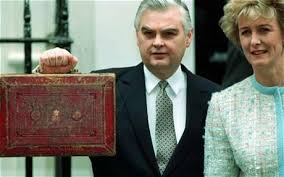Black Wednesday 27 Years On. I miss “The Economy”…

Yes, on this day in 1992, John Major’s government, only months after its surprise re-election, was forced to withdraw Britain from the Exchange Rate Mechanism.
The 1992 election is famous for the end of Neil Kinnock, the hubristic “rally” with its Queen soundtrack, and the surprising appeal of John Major standing on a box in a market place. (Of course, the important thing about John Major standing on a box in a market place was that he was shown on national television news standing on a box in a market place.)
I campaigned in the 1992 election – knocked on doors etc. In my constituency, the candidate I was championing actually won. She subsequently resigned from the Blair administration over the invasion of Iraq. I feel vindicated.
Norman Lamont, Chancellor of the Exchequer, was not a natural media performer. A badger-faced problem deflator, he looked like someone who was both out of his depth and supremely unaware that he was out of his depth. In fact, he’d been implementing John Major’s preferred policy, but he was Chancellor – the man with the battered case – and the man who seemed most culpable.
Regardless of the ins and the outs of the ins and outs of the exchange rate mechanism, regardless of the “actual” economic damage that the fiasco caused – the real casualty of the Britain’s emergency withdrawal from the ERM was the Conservative and Unionist Party’s special relationship with an idea of economic competence. Throughout the eighties and very early nineties, people who were sincerely concerned about Thatcherite attacks on the basic social fabric, were still persuaded to grit their teeth and vote Tory on the basis Tories seemed to know how to “manage” the economy and that nothing was ultimately more important than that.
After 16 September 1992, thanks to a volte face that could not possibly look anything other than a major economic misjudgement, the idea that there was anything natural about Tory economic probity was forever shattered and the Major government started to very slowly die. It took nearly five years.
Twenty five years on, what I think I really miss, is the whole idea of “the economy”. Economics is now so globalised and profits so outsourced that there is no longer any “the” to put in front of “economy”. There is no longer any common aggregate of economic circumstances that everyone in a country is meant to share.
Governments are more concerned now with “managing the narrative”. If things are going so well for you, your family, your town, or chunk of the country, then governments concern themselves with establishing scapegoats. Can the victims of recession be persuaded to turn on one another? Better yet – are foreigners somewhere to blame? Economic “success” is no longer defined in any collective terms. Donald Trump never talk of “creating jobs” – but only “bringing jobs back home” – re-enshrining his campaign narrative that if you don’t have a job it’s because some evil foreign type has stolen it. Whatever recession overtakes Brexit Britain will not trouble the Johnson (or Gove?) administration if foreigners can be blamed for it.
1992 is a year charged with nostalgia because its humiliations were informed by a jettisoned optimistic premise. I miss those days when governments wrecked the economy, because it reminds me of when “the economy” was presumed somehow to exist.
Reblogged this on conradbrunstrom.